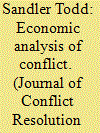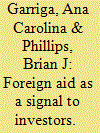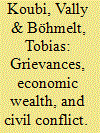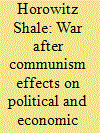| Srl | Item |
| 1 |
ID:
018260


|
|
|
|
|
| Publication |
Dec 2000.
|
| Description |
723-729
|
|
|
|
|
|
|
|
|
|
|
|
|
|
|
|
| 2 |
ID:
128982


|
|
|
|
|
| Publication |
2014.
|
| Summary/Abstract |
Does development aid attract foreign direct investment (FDI) in post-conflict countries? This article contributes to the growing literature on effects of aid and on determinants of FDI by explaining how development aid in low-information environments is a signal that can attract investment. Before investing abroad, firms seek data on potential host countries. In post-conflict countries, reliable information is poor, in part because governments face unusual incentives to misrepresent information. In these conditions, firms look to signals. One is development aid, because donors tend to give more to countries they trust to properly handle the funds. Our results show that aid seems to draw FDI-however, this is conditional on whether the aid can be considered geostrategically motivated. We also show that this effect decreases as time elapses after the conflict. This suggests that aid's signaling effect is specific to low-information environments, and helps rule out alternative causal mechanisms linking aid and FDI.
aid
|
|
|
|
|
|
|
|
|
|
|
|
|
|
|
|
| 3 |
ID:
128854


|
|
|
|
|
| Publication |
2014.
|
| Summary/Abstract |
One of the most robust findings in the literature on civil conflicts is that high income levels are associated with a lower risk of conflict onset. This article addresses the wealth-conflict link and discusses it in relation to the dominating `greed vs. grievance' dichotomy. It is further argued that the effect on conflict of grievances, in the form of horizontal inequalities, is conditioned on national wealth. More specifically, there may be a higher risk of civil war in those countries that have much wealth, but where a large share of the population is potentially excluded from accessing it. The empirical analyses testing this argument employ time-series cross-section data for 1951-2004 and find support for the theory. The authors also show that taking this conditional relationship into account improves our ability to predict the onset of civil conflict.
|
|
|
|
|
|
|
|
|
|
|
|
|
|
|
|
| 4 |
ID:
023498


|
|
|
|
|
| Publication |
Jan 2003.
|
| Description |
25-48
|
|
|
|
|
|
|
|
|
|
|
|
|
|
|
|